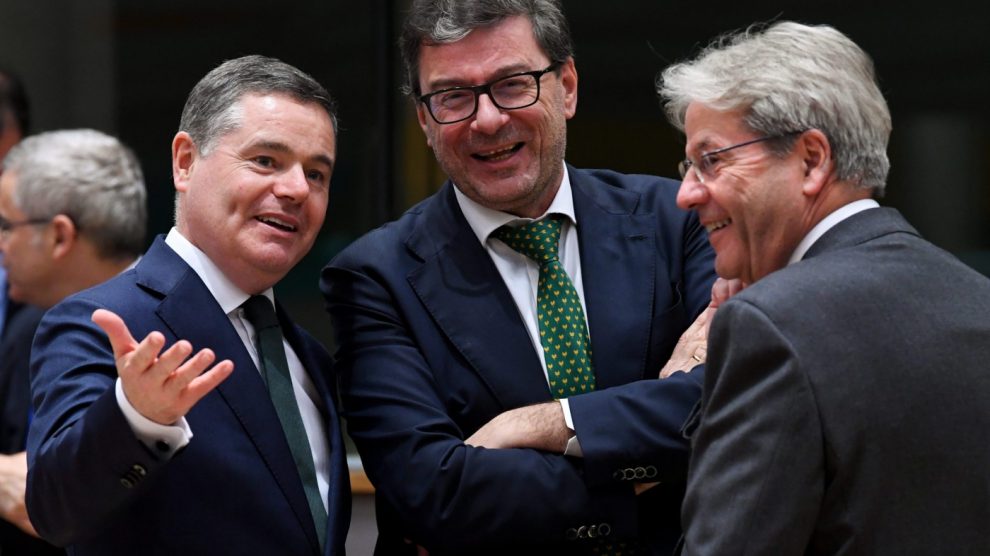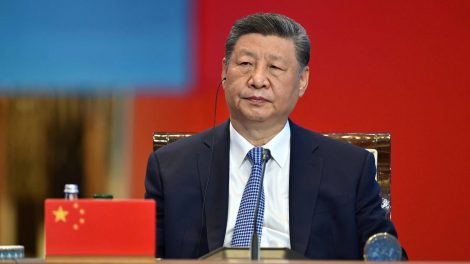Meet Italy’s Minister of Economy. On Monday, Giancarlo Giorgetti, in his newly appointed role of Minister of Economy and Finance, held his first informal minister’s meeting in Brussels. The official Economic and Financial Affairs Council (ECOFIN) awaits him on Tuesday to discuss the EU’s economic developments and fiscal policy.
- Mr Giorgetti, who is the League’s second-in-command, is perceived abroad as a moderate, open-to-dialogue partner – as opposed to the party’s leader, Matteo Salvini, who often clashed with the EU in the past.
- Having served under Mario Draghi’s government as Minister of Economic Development — and having thus participated at the Council of the European Union meetings – he’s a well-known face in Brussels.
Italy’s economy, as outlined by Giorgetti. Monday’s meeting was slated to centre on budgetary measures to mitigate the impact of high energy prices and the policy priorities of the Italian government. The Economy Minister, as is practice, shared with his counterparts the budget and economic policies of Giorgia Meloni’s new government.
- He briefly presented Italy’s priorities, in view of the upcoming budget law, and emphasised its “prudent and realistic approach” based on “the good performance of the economy on the one hand […] and the downside risks, especially related to the energy market and inflation, on the other hand,” reads a note.
- Bottom line: he sought to confirm the country’s role as a reliable and responsible partner, in line with the message brought by PM Giorgia Meloni during her first official visit to Brussels.
- Mr Giorgetti also stressed the importance of a common EU policy to counter energy price increases, recalling the economic impact of the EU’s divisions and inaction.
- Taking stock of the strong electoral results, he “highlighted the need for a new European governance to take into account the specific economic and financial characteristics of the different countries of the Union, and to recognise the central value of growth in ensuring sustainability.”
- Long story short: in line with other highly indebted countries, Italy wants softer European fiscal rules – by reforming the Stability Pact – to avoid growth-impairing austerity measures.
Paolo Gentiloni’s take. The European Commission for the Economy and former Italian PM offered his take on Italy’s next budget law, as reported by Askanews. “I trust that there will be an attitude of great caution, as is right for countries with high debts. Of course caution does not mean not taking the measures we can on energy security. We have signalled to all high debt countries that while there is an attitude of great caution, there may be exceptions for the energy emergency, and we ask that these exceptions be as targeted as possible.”
A flurry of contacts. Mr Giorgetti also held several bilateral meetings – with the Dutch Finance Minister, Sigrid Kaag, the Eurogroup President and Finance Minister of Ireland, Pascal Donohe, and the French Minister of Economy and Finance, Bruno Le Maire.
- He had already met with German Finance Minister, Christian Lindner, during his first official foreign visit – which demonstrated the pair’s willingness to dialogue, which is especially important in the lead-up to discussions on reforming the Stability Pact.
- On Wednesday, the EU commission is expected to announce how it intends to reform the Stability Pact, whose implementation has been suspended until the end of 2023.
Political dynamite? Another test looms on the horizon: the ratification of the new treaty on the European Stability Mechanism, a voluntary emergency fund that became extremely contentious in Italy – and against which both Ms Meloni and Mr Salvini campaigned very hard, depicting it as a peril to the country’s economic sovereignty.
- Reforming it “is a commitment that Italy has already made. We expect the Italian government to fulfil its commitment, like all governments,” but colleagues will give the new Italian government some time “to organise their position,” as a Eurogroup source told Il Foglio’s David Carretta.
- For now, Mr Giorgetti appears to be hiding behind the German Constitutional Court, which has not yet ruled on the new ESM treaty. “[Italy and Germany] are the only ones who have not approved it, and we are waiting patiently for [their] decision,” he said.




